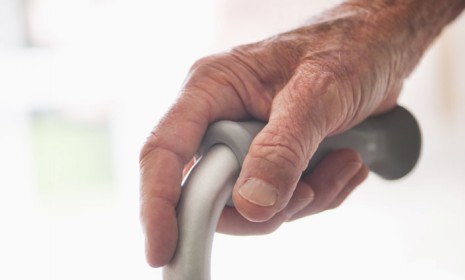Can stem cells slow the effects of aging?
Researchers from the University of Pittsburgh managed to make Father Time slow to a crawl... at least for a few rapidly aging mice

A free daily email with the biggest news stories of the day – and the best features from TheWeek.com
You are now subscribed
Your newsletter sign-up was successful
Scientists have explored everything from drugs to the body's natural senescent cells in the quest for ways to protect humans from the ravages of time. But new research from the University of Pittsburgh Medical Center suggests that stem cells may also help slow the crippling effects of aging. Could the secret to living longer, healthier lives be on the horizon? Here's what you should know:
What did scientists do?
First, they artificially engineered mice to age faster, "making them old and weak in a span of 17 days," says Carrie Gann at ABC News. The mice lived an accelerated lifespan, dying within 28 days instead of the typical two years. Then the researchers injected the mice with "stem-cell-like cells" — called progenitor cells — taken from the muscles of younger, healthier mice.
The Week
Escape your echo chamber. Get the facts behind the news, plus analysis from multiple perspectives.

Sign up for The Week's Free Newsletters
From our morning news briefing to a weekly Good News Newsletter, get the best of The Week delivered directly to your inbox.
From our morning news briefing to a weekly Good News Newsletter, get the best of The Week delivered directly to your inbox.
And what happened?
The injected mice lived up to 75 days, nearly three times longer than the others. They displayed vastly improved muscle strength and blood flow, and were unmistakebly healthier overall. "It was mind boggling," said study co-author Dr. Johnny Huard. "When I saw them I thought, 'Oh my God, I must have made a mistake and put the normal mice in the wrong cage.' But they were indeed the mice we'd injected with the stem cells."
So what caused this?
The team set out to answer that question by conducting controlled lab experiments, setting the youthful cells in petri dishes alongside cells taken from older mice. After a few days, the older cells appeared "renewed." The researchers suspect the healthy cells secreted something that helped revive the older cells. For humans, this might mean that one day we'll be able to harvest progenitor or stem cells from our own bodies while young, and have them injected back into us later to slow the effects of aging. But that, says CTV News, is "a long way away, of course."
A free daily email with the biggest news stories of the day – and the best features from TheWeek.com
-
 Tourangelle-style pork with prunes recipe
Tourangelle-style pork with prunes recipeThe Week Recommends This traditional, rustic dish is a French classic
-
 The Epstein files: glimpses of a deeply disturbing world
The Epstein files: glimpses of a deeply disturbing worldIn the Spotlight Trove of released documents paint a picture of depravity and privilege in which men hold the cards, and women are powerless or peripheral
-
 Jeff Bezos: cutting the legs off The Washington Post
Jeff Bezos: cutting the legs off The Washington PostIn the Spotlight A stalwart of American journalism is a shadow of itself after swingeing cuts by its billionaire owner